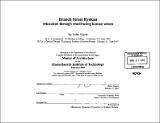| dc.contributor.advisor | Fernando Domeyko Perez. | en_US |
| dc.contributor.author | Sugeta, Keiko, 1969- | en_US |
| dc.contributor.other | Massachusetts Institute of Technology. Dept. of Architecture. | en_US |
| dc.coverage.spatial | n-us-ma | en_US |
| dc.date.accessioned | 2005-09-26T19:25:25Z | |
| dc.date.available | 2005-09-26T19:25:25Z | |
| dc.date.copyright | 2003 | en_US |
| dc.date.issued | 2003 | en_US |
| dc.identifier.uri | http://hdl.handle.net/1721.1/28260 | |
| dc.description | Thesis (M.Arch.)--Massachusetts Institute of Technology, Dept. of Architecture, 2003. | en_US |
| dc.description | Includes bibliographical references (p. 56). | en_US |
| dc.description.abstract | My thesis is a Japanese traditional Inn, called Ryokan. The is open to anyone seeking refuge from the rapid pace of urban life, including local residents and tourists, yet is limited to adults in order to keep quietness within. It is similar to a Bed & Breakfast in terms of person-to-person service, yet its emphasis is on the idea of reactivating human senses by offering an intimate experience with the surrounding nature through materials. The intention of my thesis is to explore an experience in Ryokan architect~re. The thesis introduces Ryokan architecture as a typology. Incorporating ritualistic Japanese inn traditions, the architecture is designed with a sense of order, which encourages guests to settle their state of mind. The inn investigates the notion of 'continuity of moments (in time)' through a manipulation of light and water as well as through materiality, which is to lure forgotten human senses. Communal bathing experience within the inn enhances stimulation to human sanity. Beacon Hill in Boston is selected as the site for the Ryokan. The site's existing condition is a 6000sq ft-vacant-lot. Although it is just one block-in from the very active and busy intersection of Charles and Beacon Street, the site offers quietness and tranquility. Given that I sensed the stark contrast between the very busy streets and the solitude of this site, I felt that there was an intriguing quality. | en_US |
| dc.description.statementofresponsibility | by Keiko Sugeta. | en_US |
| dc.format.extent | 58 p. | en_US |
| dc.format.extent | 6222877 bytes | |
| dc.format.extent | 12426998 bytes | |
| dc.format.mimetype | application/pdf | |
| dc.format.mimetype | application/pdf | |
| dc.language.iso | en_US | |
| dc.publisher | Massachusetts Institute of Technology | en_US |
| dc.rights | M.I.T. theses are protected by copyright. They may be viewed from this source for any purpose, but reproduction or distribution in any format is prohibited without written permission. See provided URL for inquiries about permission. | en_US |
| dc.rights.uri | http://dspace.mit.edu/handle/1721.1/7582 | |
| dc.subject | Architecture. | en_US |
| dc.title | Branch Street Ryokan : relaxation through reactivating human senses | en_US |
| dc.type | Thesis | en_US |
| dc.description.degree | M.Arch. | en_US |
| dc.contributor.department | Massachusetts Institute of Technology. Department of Architecture | |
| dc.identifier.oclc | 52392385 | en_US |
